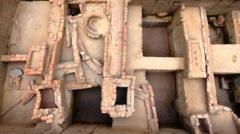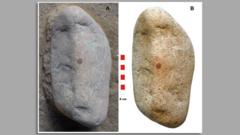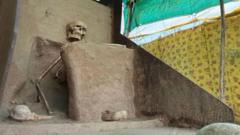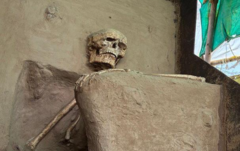The village of Keeladi in Tamil Nadu has emerged as a significant archaeological site sparking intense debates over its historical implications. An excavation conducted under the Tamil Nadu State Department of Archaeology has uncovered remarkable artefacts, including terracotta pots and evidence of brick structures, that are estimated to be between 2,000 to 2,500 years old, potentially reshaping the understanding of early civilizations in the Indian subcontinent.
Situated along the Vaigai River and 12km from Madurai, Keeladi has seen repeated excavations since 2014, resulting in over 15,000 artefacts being excavated, such as burial urns, coins, and water transport systems. Archaeologists like Ajay Kumar assert that the discoveries indicate the existence of an ancient urban settlement, claiming Keeladi was home to a literate society with specific sectors for habitation and industry.
Historically, narratives about India's early civilizations have predominantly focused on the northern regions, where the Indus Valley Civilization emerged. Keeladi's discoveries challenge the prevailing notion that urbanization and literacy were beholden to northern influences, accentuating the rich historical tapestry of the Tamil south. William Daniel, an educator from Kerala, highlights a growing sentiment of regional pride regarding these findings, proclaiming their significance in affirming the south's historical importance.
The ongoing political discourse surrounding Keeladi is reflective of broader north-south tensions in India, particularly regarding cultural identity and heritage. Historically, the idea has sustained that northern Aryans significantly contributed to civilizing the Dravidian south, a claim now facing scrutiny with the emergence of Keeladi's findings. Recent excavations have revealed Tamil Brahmi script that some experts say predates the Ashokan Brahmi script, leading to debates on the linguistic and cultural developments in ancient India.
While some experts remain cautious about connecting artefacts from Keeladi with those found in the Indus Valley, arguing against the migrations that would have made such an interplay feasible, the political undertones of these findings are palpable. Claims suggesting deliberate governmental efforts to suppress Tamil heritage have surfaced, especially after the Archaeological Survey of India's (ASI) controversial transfers of archaeologist Amarnath Ramakrishnan, who led the Keeladi excavations. Tamil Nadu Chief Minister MK Stalin criticized these moves as attacks on Tamil pride, heightening regional sentiments and calls for the recognition of local heritage.
Archaeologists, while enthusiastic about uncovering more about ancient societies, continue to face challenges in navigating the intersection of science and politics. The discourse surrounding the findings at Keeladi encapsulates a broader discussion on how history is perceived and manipulated, shaping present identities. This dynamic story resonates not only within the context of India but also provides valuable insight into how history can unite or divide, highlighting the interconnectedness of ancient societies through the remnants they leave behind.























